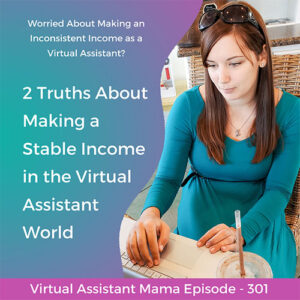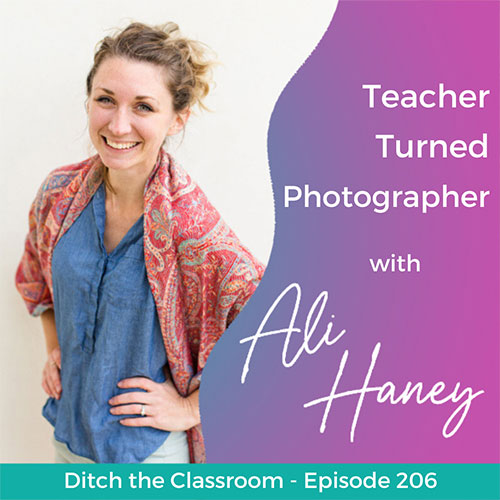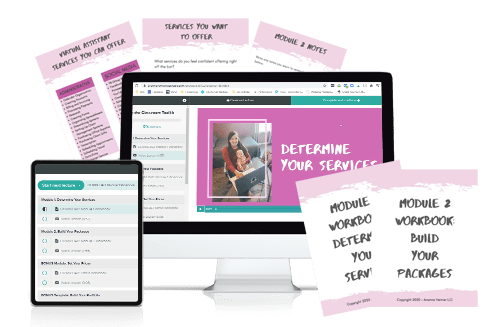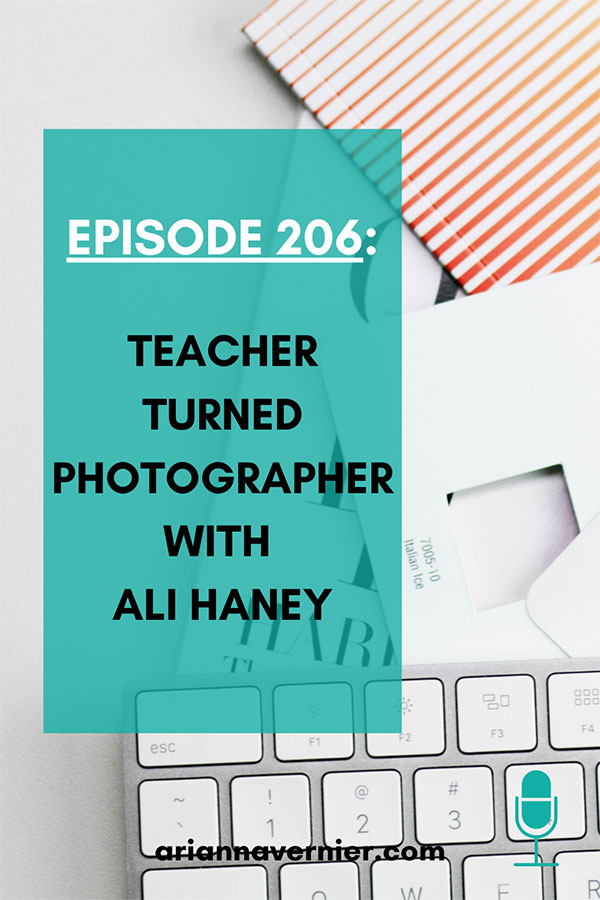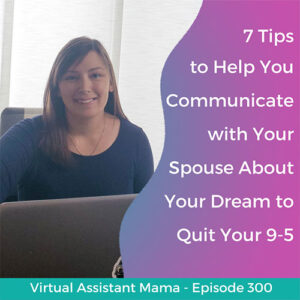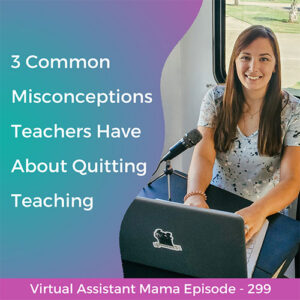Full Episode Transcription:
Hey y’all. Welcome back to the Ditch the Classroom Podcast. Today’s episode, I’m so excited because I brought on Allie Haney. She’s a former 12th grade teacher turned wedding photographer and photography business coach, and she’s. Just really in this episode, she took the time to really talk through what her journey looked like and some of the fears and struggles that she went through, and I just really appreciated her vulnerability because I know a lot of you guys are feeling the same.I felt the same, and so I just appreciated her sharing it from her perspective. So super excited for you guys to check out this episode, and we’re just gonna go ahead and dive on it.
Arianna: Hey, Allie, thank you so much for coming on the show with us today.
Ali: Thank you so much for having me. I’m excited.
Arianna: Yeah, I’m excited to kind of dive in with you and just learn a little bit, or a lot of it about your transition from teacher to a photographer. So if you could just start us out, maybe tell us a little bit about you, and then talk to us about what your teaching journey looked like, what brought you into teaching, how long you did, and all the things.
Ali: Sure, sure. So my name is Ali Haney. I now have a photography business. I’m a wedding and small business branding photographer, and I also offer some photography resources for photographers that are getting started out in their businesses at the very early stages in years one to three. A little bit more about my personal life. My husband and I, we’ve been married about nine years. We’ve got three children, a couple dogs, and we live out here in the country of Kentucky. We didn’t always live in Kentucky. We are originally from Virginia, but he was in the military and we moved all over for about seven years. Three moves in seven years, I believe. And once he decided to get out, we decided to move to Kentucky. That’s where he always wanted to be, and that’s where we landed. To give you a little bit of background about my teaching journey, I got my undergrad degree from Virginia Tech in English originally, before my husband and I started dating. I thought I was gonna be a big time city editor, like living in Boston, working for a publishing company. Then I fell in love with the man in the military and I needed something that was a little bit more mobile. So I decided to get my master’s degree in secondary education and did my student teaching down in North Carolina, and I really enjoyed it. I was at a small Christian private school and thought, you know, this is, this is what’s for me.
And I also felt like I was going back to my roots almost, because in high school I did a teacher cadet program and loved that, but didn’t think that elementary was for me. Of course, like I mentioned, I was in high school, so I couldn’t do any type of like, mentoring or student teaching within a high school classroom.I just would’ve been teaching my peers, but at least that gave me some sort of clarification what I wanted to do once I got to my master’s degree level, so after my master’s degree, I hit the ground running. Did my first year of teaching and I was in a public school in Eastern North Carolina. I taught high school English. I was a 23 year old teaching high school seniors.
Arianna: Oh dear.
Ali: Yes. Yes. And I also coached as an assistant coach, cross country for boys and girls and varsity soccer for the girls team in the spring. And so my days looked pretty full. I left the house usually between 5:30 and 6 in the morning and got home around 5:30 and 6 in the evening.
And then just like, I’m sure many teachers can relate, planning period does not give you enough time No to. Not only plan all of your lessons, but also grade all of the papers. And, um, so I found myself working, like I said, leaving the house five 30 and six and working until nine 30 or 10 at night. My first year of teaching coincided with my husband’s first military deployment, so he left in July of that year, I believe, I think it was 2015. Or ‘16, 2016. And I started teaching in August. And I guess that’s the way I used – one of the things that I used to cope was just pushing myself, you know, further into curriculum, further into planning, further into coaching. And I realized that like at the end of the day, I had nothing left to give at that point. We didn’t have any kids, but I was, you know, of course, Navigating a deployment where we had an eight hour time difference and when I was getting off work, he was, you know, it was 2:00 AM his time, so he either had to stay up late or I had to stay up early or get up early rather, and it was just, It, it was emotionally draining and he came home January of that my, my first year teaching.
And I just remember being so used to, you know, the grind and as soon as he got home, soccer season started and there were a lot of way games. Sometimes I wouldn’t get home until nine o’clock and it was just kind of a tension in our marriage as well. So it wasn’t just, you know, the stuff that I was facing every day at school. It was like I couldn’t just leave it at school and mm-hmm. It was really impacting our relationship. I felt like something had to give and it wasn’t gonna be my marriage, so that’s when I had this very long conversation with my husband. Very long conversation with my department head, who ended up being one of my best friends and still is, has supported me throughout, you know, my transition out of the classroom, even though she’s a veteran teacher and ended up becoming an administrator, but she was a rock throughout that process as well. And it took me a long time to make the decision. Graduation was, I believe the first week in June that year, and it wasn’t until the beginning of August we were getting ready to go back for teacher work days and I finally just, I wrote the resignation letter. I only lasted one year. I wrote the resignation letter and I felt this feeling of relief, like even to this day, like if I think about returning to the classroom, it gives me this kind of tight feeling in my chest almost like I’m gonna be suffocated. I know that sounds a little bit dramatic, you know?
Arianna: I feel you.
Ali: But it was just one of the hardest years of our lives individually, because my husband was deployed and also as a couple. And at that point we had only been married a couple years, so we had a lot of, I had a lot of challenges within the classroom and I don’t want to. You know, reign on any specific school district or, or anything like that? That’s not my intention. I, I truly believe that the administrators, the teachers are, are doing the best that they can with the resources that they’re given. But unfortunately, sometimes the best is not enough. Like my first year of teaching, I encountered drugs in my classroom. I enco encountered fights in my classroom and sort of the, uh, The straw that broke the camel’s back was when I found a bullet in my classroom and I had no real idea where it came from.
So I turned it into the administration and she said, oh, well it’s only a 20. It’s probably just a hunting gun. It’s not that big of a deal. And I was like, what? Not that big of a deal like that. It should be a big deal. Then on Monday morning I followed up with the administration cause I hadn’t heard anything all weekends. And lo and behold, the student that found the bullet in my classroom during third period, Friday, third period, Monday, rolled around and was like, so Mrs. Zini, what happened? Like, what’s going on? And I had nothing to tell her. They told me it’s Friday afternoon, we’re swamped, we’ll try to get to it next week.
Never heard anything. I felt very confident in my ability to manage my classroom, but there were very few times, like that time that I needed to enlist help outside of my classroom. And those few times, I, I didn’t get the support that I needed. And that’s when, you know. Almost every teacher, I can guarantee you that they are, like I, they go in with high hopes of wanting to change the future through the children. And I felt at that moment that I can’t change anyone’s future if I, if I’m doing this alone. Yeah. And that’s very much how it felt. So that was like, like I said, the straw that broke the camel’s back. And although it took me a long time to make the decision, once the decision was made, there was a sudden, very sudden piece a about it. And I, I, at that point, I did not have. Any plan after leaving the classroom. It was purely a, a leap of faith. I really appreciate you just sharing kind of that vulnerability of what you felt going through that, because I think a lot of people who are, who are still in the classroom, They have so many hesitations and fears about like what are they gonna be able to do outside? But you have to think about how is teaching impacting your life now? And if it’s so negative that you don’t have time for your spouse, you don’t have time to do the things you wanna do because you’re working till 10:00 PM at night and going to school in the morning by 6:00 AM what kind of life is that to live? That’s not the, the life that God has designed for you. And if. That tension is building and building and you’re just really feeling called to not be teaching anymore, then God has another plan on plan for you, and you just have to be willing to take that step of faith. So I’m like you. I kind of jumped with no plan either.
Arianna: My daughter, I was pregnant with her, and so my husband and I agreed we would take off the first year of her life. I would take it off of teaching, but the plan was I would go back and I would try to figure out what I was gonna do once I did go back. But then God had different plans and I started this business. So if you could just share a little bit with us about what it looked like. Like I know you said you put in your resignation in August. Can you walk us through a little bit of the journey from that point to how you got into photography and you know, what that experience was like?
Ali: Sure. It was kind of a whirlwind I sent in that resignation letter, and again, that immediate relief just washed over me. I did still have to go to two days of teacher work until they found a replacement for me. Those two days were hard because I felt like I was abandoning my team, but it was much better than abandoning y, you know, myself and my sanity. To progress onto how I found photography, I fell in love with photography. Through my own wedding photographer. Obviously her work, which is why we hired her, but also loved understanding and getting to know this side of business. And I, like I said, left the classroom with no real plan. I thought that there’s no way that I can make money from doing something creative. Like it’s just not traditional. And I think a lot of us that are around our age got drilled into us. You know, you go to college, you get a job, you. Stay on that path, and, and there’s nothing wrong with that path. Don’t, don’t hear me wrong, but it was very refreshing when I decided to take a leap of faith and the photography business started out very slow. I did a lot of googling, a lot of tubing, as I’m sure most beginning entrepreneurs do. Like my background was in English and, and classroom management, not in. A photography, like even the creative side or B business, like I didn’t. I did not know anything about being an entrepreneur, so I was googling what’s a sole proprietorship, what’s an L L C? What are the differences between the two? How to shoot in manual mode, so like what is aperture? And if you’re a photographer, you’re like, obviously you know what aperture is, right? Well, I didn’t when I started my photography business. So that’s how vulnerable I knew I was. I first started shooting everything under the sun. You name it, I shot it. First birthday, cake smash, newborn, maternity. Literally any, any inquiry I got, I was like, yep, let’s do it. Sign me up. After that, when we moved from North Carolina to Quantico, which is right outside of DC, we moved with the military and I then took it as an opportunity to be able to shift my business into exactly the niche that I wanted at the time, which was weddings. I just went all in on weddings. My daughter was born around the same time that we moved. I moved, we moved at 36 weeks pregnant. It was crazy. Yeah. At that point I had been in business just over a year and I took a short maternity leave and then, hit the ground running in 2019 with booking my own weddings and second shooting for other photographers to try and build my portfolio.
A, just the general experience I needed on a wedding day to know how to kind of navigate the craziness that is the wedding day, and B, to to build the portfolio within that specific geographical area cuz I didn’t have much from dc. So after that I was ready and like, oh, so excited for 2020. And of course everyone knows what happened in 2020, so I ended up getting pregnant again. Our son is part of that covid boom. And all of my spring weddings got pushed to the fall. That was challenging because our son was due in September at, at least in Virginia. I know it was different in every state in Virginia. There was a very small window of time like September, October where things started to open up a little bit and that’s when everyone was pushing to do their reschedules and I ended up having to hire, you know, it was like my first, like full, full swing wedding season and I ended up having to hire associates to shoot weddings for me cuz I had a C-section and physically couldn’t do it. So that was, that was hard. But after that, that year I was able to really kind of do a deep dive into branding photography as well. And that’s when, you know, a lot of the small businesses were suffering.
I was like, you know, if there’s a way that I can give back, that’s what I wanna do. And shot a few branding sessions for a couple of businesses free of charge. Again, to give back, but also to start my branding portfolio. That’s where the love for small business branding photography came into play as well. So, yeah, I. I grew a lot. I learned a lot in a crash course fashion and would not recommend it. Would not recommend learning in a crash course fashion. I do recommend starting your own business, and that’s why I created the photography framework, which is the educational resources for beginning and aspiring photographers looking to start or grow their businesses.
Arianna: I love how much our journeys are so similar because you know, I started my business in 2019 and then. It’s gone through covid, it’s gone through all the same things and so yeah, crash course, like Googled my heart out, taught myself how to do website design on YouTube. It just goes to show like if you have that desire and that drive, you can figure things out. Like you said, I do recommend investing in a course or someone to help teach you who can help you avoid the mistakes, so I love that you mentioned your photography framework course. I’ve got a course as well for helping teachers turn into virtual assistants if they want. So yeah, don’t do what we did and like bootstrap everything cuz it’s gonna take you way longer. Try to, you know, save up and invest in a program to help you scale it faster, but, I just love how you, you talked about that, that if you have that drive, you can do it.
Oh, absolutely. And one thing that was holding me back from purchasing a course at the beginning of my, the start of my business, well, it was finances. I felt like I didn’t have the money to be able to spend on a course because I was just starting out. But B, it was confidence and I, I think that I wasn’t totally invested or competent in my ability, so I didn’t want to like, Waste money on myself. I think that if I had just been able to harness that confidence that the investment would’ve been a no-brainer.
And looking back now, I actually cost myself a lot of money by not investing in a course. That’s how. Yeah, exactly. Exactly. But like when you’re going through it, the steps that you, like yourself, like you don’t see because you don’t know what you don’t know. A quick example is that I originally started my business as a sole proprietorship, and a sole proprietorship really leaves you open to, you know, a lot of. Liability for those that are listening that don’t know. Basically, if I were to get sued, let me give you an example. At a wedding, someone knocks over a light stand, trips and breaks their arm. If my business is formulated as a sole proprietorship, then they can sue me personally as well as my business. So my home, my car, any of that. My personal investments, those are all essentially up for grabs versus an LLC. If that same scenario were to happen, they can then sue my business. But my personal investments, my personal house, car, all of that is safe. So when I started my business as a sole proprietorship, I had no idea that that’s what that meant. I just knew it was the cheapest in quotation marks. Yeah. But really in the long run it, it’s not, and thankfully I never did get sued, but. In the off chance that I did it would’ve been, you know, uh, a terrible error on my part. Yeah. As a business owner, so, yes.
Arianna: Yeah, I did the same thing. I started out as sole proprietor and then I was like, Hmm, I should probably upgrade this. So I feel like it there, it seems like we all try to reinvent the wheel and there’s, that was when I was like, it’s gotta be a better way. That there’s no way that all of us have to go through these same steps, troubleshoot these same issues, put ourselves at the same liability to be able to be successful.
Ali: Yeah, and that was another reason that I started the photography framework. A, because of all of this, not wanting every entrepreneur to reinvent the wheel, but B, it was also a way for me to kind of marry my two passions, my time in the classroom, and being able to teach people, and then also my passion for photography and entrepreneurship. It was a really nice way to bring those two together.
Arianna: I love that. I’d love to know, what would you say is the biggest thing you kind of had to overcome from being a teacher to becoming a photographer? What, what was the biggest hurdle you had to jump through?
Ali: Oh, I try to think of it split up into two different kinds of categories. There’s like the actual technical stuff, you know, like I mentioned, shooting and manual. That was something that I had to learn from. Scratch the business stuff, the technical L L C versus proprietorship, finding business insurance, making sure I wasn’t getting scammed. Figuring out how to design a website on my own, bootstrapping, all of that. But like I mentioned before, I think it was more the emotional side of things, navigating the leap of faith to go from the classroom, having confidence in myself that I could build something from nothing to be able to supplement. My husband’s income was equivalent to my teaching income. I mentioned before that I had a, a lot, a lack of confidence, and I think a lot of entrepreneurs do. I can’t speak for everybody, but I know us in the creative industry, we tend to get a little angsty. And so I think once I find my confidence, I try my best to hold onto it. But you, you know, just like any other, Type of career. The imposter syndrome sometimes comes sneaking up on you and you don’t realize that it’s about to bite you, but it does. But kind of holding onto that confidence is key for me.
Arianna: Yeah, I agree. And I think a lot of times it’s hard for teachers to see how their skills can be applied to other industries, and that’s a big reason why I started this podcast to show teachers. Just because you’ve only taught, you know, kindergartners, for example, for me or 12th graders, doesn’t mean you can’t use those skills in a different way in a different industry. Every teacher has the ability to figure shit out. Cause we gotta do that every day in the classroom. Every teacher has that willingness to learn and the ability to adapt. And that is so helpful and crucial in so many different industries. And so, There’s tons of businesses out there who would love to hire teachers because they, they can figure things out and they can take nothing and make it into something. And so I just like to encourage teachers with that, that even if you don’t know what you’re doing, you just have to take that step and then you can figure it out as you go. But you do have skills that can apply to other areas.
Ali: Absolutely. So I think as teachers we kind of define ourselves as our, our subject area, or in elementary school, it it your grade level, like as an English teacher, I think what in the world did I do in college that prepared me to be a business owner? I read Shakespeare and dissected poems for my assignments. Right? But how much of. My business is being a content creator, is writing a blog, is thinking of ways to present information so that it captures people’s attention. That’s marketing like there are so many soft skills that I feel like are not valued. Like you said, teachers have the ability to figure shit out. We are gonna get the job done. And usually with less resources than the typical person. How many times have you heard the story of like, you, you know, we don’t have any money to buy markers. Somehow teachers find it, they scrape it up to find resources to, to make that job happen.
And honestly, like what, what is being a teacher, but. Interpersonal skills as a kindergarten teacher, you probably had to sell the fact that P was a cool letter. I had to sell The fact that Beowulf could be interesting, you know, like that, those interpersonal skills, those I use every single day. I use ’em right now. I use ’em when I speak to clients on inquiry calls. I will never, you know, forget the day that one of my bridesmaids, um, at one of the weddings was like, How do you remember a bridal party of, you know, 12? How do you remember all their names? Oh, I used to be a teacher. That was one of the things that I prided myself on, was to give me two days with my 90 students and I remember everybody’s name. There’s nothing more important or makes you feel more special when someone remembers your name. That is one of those skills that I took from the classroom. You might not think anything’s going on up in my head, but I’m, but her name is Bailey and she’s got a blue dress on b and b like that. I’m constantly, you know, thinking behind the scenes to figure out ways to find ways to make people feel special or seen or heard, which is what we do in the classroom every single day.
Arianna: Yep. I love just, you know, trying to relate things in business to do things in teaching so that we can start to bridge that gap and help teachers feel more confident as if they are feeling called out of the classroom, helping them feel more confident as they take that step. So I appreciate you chatting with me about that.
Ali: Yeah. Yeah. It’s those soft skills that you feel like might not translate, but they absolutely do.
Arianna: Yeah, I agree a hundred percent. I would love to ask you a question that I ask on every guest episode on the show, and it’s if someone wanted to start their digital classroom journey, but they just felt too overwhelmed, what would you tell them?
Ali: Ooh, that’s a good one. So I will tell you how I make most of my major decisions, and that is with a ProCon list. So kind of set yourself up with a scenario. If I were to stay here one year longer as a teacher in the classroom, what good would come out of it and what. Bad would take a toll on me. And I think us as teachers, we want to stay as optimistic as possible and it’s hard to almost have that realization of like, this isn’t good for me. But sometimes when you see it on paper, you have one or two pros and four or five cons. It’s hard to argue with what’s right there in front of your face. So that’s, that’s probably the biggest piece of advice that I could give somebody that’s anticipating a possible change. One of the other ways that I make big decisions, which is, this is embarrassing. I can’t really believe that I’m admitting this, but flipping a coin heads, I stay. Tails I go. And based off of what you see on that coin, the feeling that you get that immediate gut feeling, don’t overanalyze it. If you feel relief when you, when you see I go on tails, then that’s where you need to be.
Arianna: That’s literally how we chose my daughter’s name by flipping a coin. So I love that. Oh my gosh. We’re not the only ones. That’s awesome.
Ali: Okay. I’m glad I’m not the only one that makes life decisions based on coin toss.
Arianna: This episode has been so fun. I love getting to know more about you and having you share your story here. Allie, I know you talked a little bit about your photography framework already. Can you talk a little bit more about what’s in it and what it helps people do?
Ali: Absolutely. Absolutely. So the photography framework is made up of 10 sub frameworks, essentially the 10 areas of business that I felt least competent in when I first started my business. Those harder skills, I guess, that we don’t get from being a teacher. That’s what I really wanted to hone in on those 10 sub frameworks are legal and financial. So all of those L L C and sole proprietorship questions, which bank account is best for me and my business. All of those things, we go into a deep dive. Second framework is equipment. Equipment was something that was one of the major investments at the beginning of my business, and I definitely took a couple of missteps. So I would love to be able to save someone’s couple of hundred. Thousand dollars at the beginning of their businesses. The third one is portfolio building. Of course that is important as a photographer that goes into how to be a great second shooter, how to get assisting jobs at weddings, how to use styled shoots to grow your portfolio. Fourth framework is pricing. I feel like that’s a hot button question all of the time. How do I know when I’m, should I shoot for free? How do I know when I’m ready to start charging, what do I charge, how do I calculate it, cost of doing business, all of that good stuff. That’s all wrapped up into the fourth pricing framework. Fifth is workflow. That is something that I pride myself on and I feel like I definitely took from my teaching roots to get that organized work. And make my clients feel special throughout their client experience with me. So that includes all of the email templates that I send throughout my client experiences, specifically for weddings as well as questionnaires for engagement sessions, wedding days, family formals, all of that good stuff. Lightroom and file organization. This one might sound silly to anyone that is outside of like the photography world, but anyone that has a photographer, regardless of whether they are three months in or three years in, you know, the sheer amount of digital clutter that comes with being a photographer and the sheer size of all of that clutter. Raw files are huge. So knowing how to store them is key. Number seven is branding. How to choose your brand Colors, how to choose your business name, because I do find that a lot of photographers at year two and three are looking to go through a rebrand because they are. Finding, you know, their more ideal client and their business didn’t start out the same way it is now. And I think it’s great to hit the ground running with a business that can fit you. Not only now, but in five years, once you’re growing and you find yourself a little bit better. So that’s something I wish I had known at the beginning of my business as well. Eighth framework is marketing. Of course, we can’t bring in any money if we don’t market ourselves or if no one knows that our business exists. So I go into a deep dive of all the different ways that you can market yourself. That’s through social media, through blogging, through networking even. And also one of my favorites is bridal shows. So if that’s something that you have been interested in, then definitely the marketing framework is, is for you. Framework nine is if you don’t hire Ariana to design your website, then um, you’re like me and you decided to bootstrap it from the beginning. Then that is basically a very quick breakdown of how to purchase a do domain name, attitudes, who you want to host your school. Host your website and how and what needs to be on it as a service provider. And finally, one of those soft skills that I said I pride myself on earlier is office organization and how to continuously not only work in your business, Shooting, editing, all of planning social media, but also working on your business and seeing the bigger picture so that you can hit those milestones to continue to grow your business.
Originally, I sold this as a full course, all digital P D F resources that you can use at your own pace, and it’s still available that way, but I also split it into individual resources. So like I mentioned earlier, for example, if you really are looking to dive into bridal expo or bridal shows, you can simply just buy the bridal expo or bridal show resource. If you just need help with pricing, then you can just buy the pricing resource. So that was kind of one of the ways that I. Took a step back and really wanted to meet photographers and business owners right where they are, as opposed to having, you know, if you only have two areas where you need help and having to purchase all 10 frameworks, that doesn’t really make sense. So that was my way of, of trying to, to meet everybody right where they are in their business.
Arianna: I love that, and I will have, for everybody listening, I will have the link for Ali’s photography framework in the show notes so you can go check out everything that’s included and you know, just expand upon what she just explained. But yeah, I think that’s a great, great resource for anybody that’s curious about becoming a photographer to go check out.
Ali: And we have a few freebies on my website as well. The most popular one is a small business startup checklist. I can send you the link to that to put in show notes as well, and that is super helpful. If you are sort of in that ProCon list making portion of the phase of thinking about maybe leaving the classroom, that can kind of give you that very general framework of this is what it might take in order to make that step.
Arianan: Yeah, I agree. It has been so great having you on with us today. Where can people come and connect with you and become your best friend?
Ali: Oh, that’s so sweet. So I actually have two different Instagram accounts. One is for my photography business. That’s at Ali Ray Haney, a l i r a e h a n e y. And then my photography framework, Instagram is at @thephotographyframework. You can connect with me on either place. I’m on every or both of those every single day, and happy to have a DM conversation with you to see how we can grow your business.
Arianna: Perfect. Well, thank you so much again for coming on. It has been such a blessing to have you and I cannot wait for everybody to hear this episode. I think it’s really gonna connect with them.
Ali: Thank you so much. I really appreciate this opportunity. I’m so excited.
Arianna: Yay. All right y’all. We will see you next episode. Make sure you connect with Allie and I hope you have a beautiful day.
